STROMLINIEN
Stromlinien - Ein Logbuch
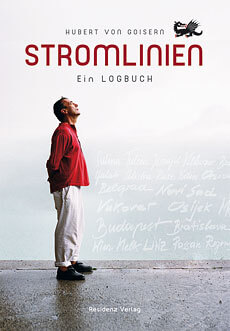 Streamlines
- A Logbook by Hubert von Goisern
Streamlines
- A Logbook by Hubert von Goisern
A musical bridge through Europe along the Danube:
the logbook of the tour
This book tells the story of the journey that Hubert von Goisern and his friends undertook on a cargo ship converted to a stage ship. With a floating, musical, singing village, as he called it, he sailed the Danube upstream and downstream through new Europe, from the centre to the very edges, from Linz to Rotterdam and down to the Black Sea.
He tells of encounters with people along the river banks, of musical colleagues from a dozen different countries, of joint concerts, of the longing for freedom and distance and of a vision: unity in variety. Music is the common language and the message. And Hubert von Goisern is an artist who carries this out into the world, who looks for understanding and exchange across all boundaries. And so he sets off on journeys, off to uncharted territory and returns time and again as a new person.
Three Austrians discover Europe's diversity
Europe lives from its diversity. Nonetheless there are always great efforts to unite Europe. The European Union wants to equalise living conditions. Three Austrians have written books on how different Europe was and is. They are all a discovery for those who like to be confronted with the unusual.
[...] Very different ship passages from those in steerage from Hamburg to New York make up the book by Hubert von Goisern. The musician, who began 20 years ago to use the music of the alps as a source for inspiring rock music, undertook a concert journey on the Danube in 2007 from Regensburg to the Black Sea. Along the way he moored with his concert ship in order to give concerts with local musicians. In 2008 he then sailed along the Danube, Main Danube Canal, Main, Rhine, Neckar and Maas, to musically explore the western part of Europe from the waterways.
Stromlinien is a logbook that developed from the blog that accompanied the journey. Goisern has supplemented the book with longer writings about the preparation of the costly journeys, which came about as part of European Capital of Culture Linz. Goisern takes the reader with him on his journey, which he describes as one of the last adventures in Europe. The diversity of experiences, surprises, disappointments and moments of jubilations all come across authentically. Where Europe is expected by him - and the reader - to be at its wildest and most incalculable, things are the least complicated; for example in Serbia and Bulgaria. And there where Europe has also been a political arena for decades, the scepticism is at its greatest, for example in Germany and Holland.
But above all Hubert von Goisern opens the view to the beauty of the Danube and the river landscapes. Selected photos round off the wonderful book. And invite you, like the other two books, to set off to explore Europe for yourself.
Everything liquefies
Cross-border commuter Hubert von Goisern reads his travel diary "Stromlinien" in the Stuttgart Theaterhaus.
Dozens of musicians are playing on Hubert von Goisern's concert ship that went first to the Black Sea and then up to the North Sea. But this is happening on film, it's all a few years ago. When the film is stopped after a few minutes, the initiator of the musical-nautical grand project walks all along to the little table on the Theaterhaus stage. Only his book accompanies him. "I find it strange that one reads to others from a book," says Hubert von Goisern. When everyone in the audience can read for themselves anyway.
He then reads from his Stromlinien, his logbook of a great musical adventure on the Danube and Rhine, but he tells further stories, above all about opposition. About the harbour master in Holland, the police in Bavaria, the mayor in Ukraine. And when he is finished he summarises his extensive river tours of the summers of 2007 and 2008 thus: "It was tough at times. But it was the greatest thing I've done in my life."
That is translated from the congenial dialect spoken in the Salzkammergut. It is from there, or from Bad Goisern to be precise, that Hubert, whose surname is actually Achleitner, left to look for music, to feel, gather, play. His travels had previously taken him to the Philippines and to Africa and later, for example, to the Danube delta: "Everything here stands under water, lives from the water and with the water. Everything liquefies, including the drive to grasp the world and what is happening within it", Hubert von Goisern reads from his Stromlinien. When he reaches the harbour of Ismajil in the Ukraine a little later, "15 uniforms welcome us, two of them women - who, it turns out, are the only ones who can speak English."
Hubert von Goisern masters the high art of engaging with his environment with wonder. It is a feature of his music - and now of his travel diary. He can observe, combine and mesh what happens in his head and in a world that mostly offers cross-border commuters like him inspiration and obstacles as a package. The man who has found his language in music has no problems with words on his musical journey. Now he is dreaming of a festival at Lake Tanganyika in East Africa.
Von Goisern and his experiences on the Danube
Ulm. The biggest adventure of his life began at the Donaufest 2006 in Ulm and now he had come to Roxy to take stock with his logbook Stromlinien: the former alpine rocker, film soundtrack composer, actor, fashion designer and traveller between worlds Hubert von Goisern.
He travelled the Danube with a concert ship down to the mouth into the Black Sea and made music with artists from the bordering countries.
It sounds simple, but in terms of organisation it was an adventure too, von Goisern said at the reading of his logbook Stromlinien and revealed further talents from his rich fund: captivating storytelling and a subtle humour.
The project that gave eastern European artists the opportunity to play together with the Austrian bard in their homeland couldn't have taken place without the Donaufest: in Ulm he made the first contacts necessary to overcome the borders and his current resumé in book form of the journey from 2007 to 2009 is an affectionate memento of the exuberant hospitality and spontaneity of the people of the eastern European countries of Bulgaria, Romania and Ukraine, through which the Danube flows: in complete contrast to the organised "Europeans" of the EU in Strasbourg and Brussels, who nearly sandbagged the plan to experience Europe in flux, so to speak, with the "immobilising omnipotence of their bureaucracies", as Goisern puts it.
The boundary in the mind is the most difficult
It is precisely the illustrated barriers to the ship expedition that make the book so exciting. Like for example the Bavarian police who followed the ship with sirens blaring and his homeland of Austria that turned out to be a world of institutes, ministries and secretariats with its formalities and cliques of benefice guardians.
Yet it was the European Capital of Culture Linz that ultimately made the journey possible with a grant.
There they understood what deep European thought was behind sailing the Danube up and down with a floating, resounding village, as Goisern called his transport barge, upstream and downstream through the new Europe, from the centre to the edges.
Excerpts from a video gave the impression of what had happened on this ship: fantastic music with the best artists from the bordering countries.
The conclusion from Hubert von Goisern: "For four years we experienced the divisive and unifying strength of the great rivers of Europe. The borders we came up against that were most difficult to overcome were those that are not seen: those in our heads".
The wild river and its people
Musician Hubert von Goisern presented his book "Stromlinien" with stories and readings in Roxy.
Experiences and encounters on his expedition by concert ship on the Danube are recorded within the book.
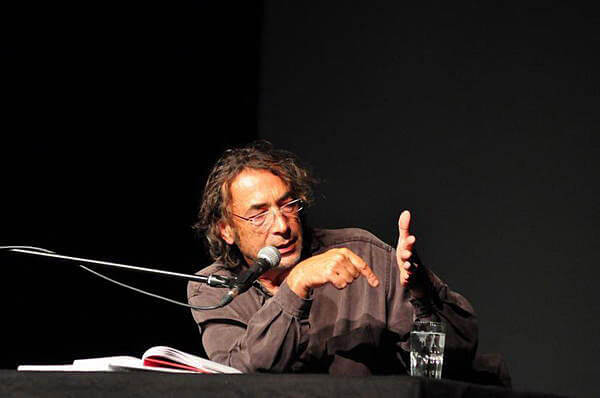
Hubert von Goisern was evidently not so pleased to hear one question from the audience: "Do you have your accordion with you?" A brusque "nope!" was the answer. Because on this evening at the Roxy in Ulm von Goisern wasn't even there as a musician, but rather as author and reader of his book Stromlinien - Ein Logbuch.
A logbook, because it is about two river expeditions through Europe. On a nearly 100m long convoy that consisted basically of the tugboat MS "Wallsee" and a transport barge converted to a concert ship. It sounds simpler than it ultimately was. Because - as you can imagine - the bureaucracies of every country are immediately on the scene when it's a matter of putting obstacles in the way of "anarchists" like Hubert von Goisern.
Why does this musician have to sail up and down the Danube with an enormous ship to give free concerts anyway? Something must be off here ... Hubert von Goisern had to use more or less elegant methods ("I berated the Culture Minister for half an hour") in order to reach his goal and a massive pile of money (more than four million Euros). Von Goisern is someone who can be very persistent when it's a matter of realising a vision. Probably a strength that has brought him to where he is today. Without a doubt he is one of the longest-lasting European musicians. Someone who understands like no other how to connect the music of his homeland of Goisern with every possible and impossible input from other styles and countries, without the result becoming an unbearable musical shambles. So, someone who knows what he wants and also mostly gets it.
This time the Danube tour. On a river that is much more than just water to him: "a gift of nature that brings people together". And which is still a wild river and can assume terrifying dimensions in flood. Hubert von Goisern experienced this river, which is also an Ulm river, in all its facets and, much more importantly: he came to know the people who live on it.
There were hesitant women from city administration, who would have cancelled the event just because of the gnat plague: "What about the mosquitos?" Von Goisern placated them, claiming that he's won "Autan" as a sponsor. There was the Ukrainian mayor, from whom compromises could be wrested most quickly with the unifying medium of vodka. And there were of course the musicians from the all the countries along the shores of the river too. Like the Serb Rambo Amadeus, or the unbelievable Roma bands that were guests on the concert ship.
People from the "Wild East" who had made Hubert von Goisern a little pensive in the run-up. You hear these things. In his first calculation 30,000 Euros had been reckoned for bribes. He didn't need the money. At least, not for bribes. The most trouble was elsewhere: "We paid a fine three times on the whole journey. And each time it was in Bavaria."
Far, far away
This project came from a powerful idea: to sail the Danube with a ship down to the Black Sea, organising concerts with musicians from the bordering countries. The Upper Austrian artist Hubert von Goisern realised the apparently impossible - and has written a detailed logbook of his journey. Ingeborg Jaiser followed his dream.
An expedition by ship on the Danube and Rhine - across Europe - may be one of the last great adventures still possible on this continent. For four years Hubert von Goisern experienced the separative and unifying powers of these rivers. And comes to the conclusion: "The most difficult boundaries we came across are the ones you can't see. The ones in our heads."
Meanders, detours and ways out
The world musician and globetrotter had long dreamed of a concert ship. When the venturous route on the African Lake Tanganyika proved to be barely feasible, the similar idea of a journey on the Danube grew, from Regensburg to the Black Sea, through fourteen countries, accompanied by musicians from the different regions. In Martin Heller, Manager of the European Capital of Culture Linz 2009, Hubert von Goisern met a visionary impresario, who promised his support as early as 2005. Only the original request to document the project in a weblog wasn't for von Goisern - too unfiltered, too unconsidered, too impromptu. No, it should be a book, the diary and logbook of an international commuter.
But the first research trips in spring 2006 read like a satirical report about the dangers and snares of European cultural advancement. Von Goisern's capacity for enthusiasm is confronted everywhere with ignorance, arrogance, cynicism. In Bratislava people are more worried about the summer mosquito plague, in Budapest there are warnings about the countryside - but the further east von Goisern goes, the more openly and warmly he is received. Contacts are made, ministries, magistrates and media representatives are visited, musical partners engaged, a crew is put together, press conferences held, plans made and discarded again.
Europe in flux
The team starts in Germany in June 2007 with a transport barge converted to a concert ship. The journey in the "floating, singing, resounding village" is to last two years, first travelling down the Danube to the Black Sea, then up the Rhine to Rotterdam. And Hubert von Goisern is successful in making musical bridges, between artists and cultures, between east and west, between the longing for what was far away and the blessing of what was close. Wherever the ship docks colleagues make guest appearances at the concerts: Xavier Naidoo, Haindling, Konstantin Wecker, Klaus Doldinger, Willi Resetarits - as well as regional musicians from Bulgaria, Romania, Moldova.
Von Goisern portrays the stops on his ship and concert expedition in detailed, impressive episodes, at times euphoric, at times thoroughly frustrated, at times cautiously sceptical, at times justifiably proud. He transcended borders with his mammoth project and experienced Europe literally "in flux". His substantial, lovingly designed logbook, illustrated with numerous photos and illustrations combines the dream of a united Europe with the bliss of music and nature.
In the etched lines of Lake Tanganyika flows the Danube
He floated in on a concert hall. For three years Hubert
von Goisern went forth
singing on a high river, always heading wherever the sky met the Danube.
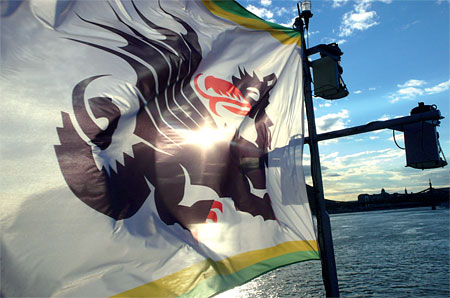
He dropped anchor for encounters and emigrated singing to foreign cultures. Resolutely leaving the secure harbour of a vision. For three years Hubert von Goisern travelled the Danube with his concert ship, upstream and downstream through Europe with boundless curiosity, from Linz to Rotterdam and to the Black Sea. Together with the citizens of the different Danube countries the Austrian organised concerts of great sound. Everywhere he went people made themselves understood with music.
During this time von Goisern kept a diary, rather a logbook, about the initial hurdles faced in putting into action his polyphonic project, about his experiences and impressions while travelling. In May of this year the book was published as Stromlinien.
It was with the trumpet that Hubert Achleitner alias Hubert von Goisern began his career as a musician. At the age of five he gave his parents the facts: he wanted to be a conductor, Hubert told them plainly. His first musical instrument was a trumpet, guitar and accordion followed. After long stays abroad he began studying at the Wiener Musikhochschule. In 1992 he made his breakthrough with his band, the Alpinkatzen. Since then the artist has developed numerous projects, with interludes in the world of film and fashion as well as music. And then three years ago - the leap into cold water.
A hijacked dream
Originally it was to have been Lake Tanganyika, this is the place the musician had originally reserved for his vision. The idea was to organise a festival, with artists from every ethnic group living along the almost 1000 kilometre long and up to 1500 metre deep lake. A contribution to unity and understanding among people. However the nostalgic dream was soon hijacked: a smouldering civil war in East Congo, simmering flashpoints, media reports breeding sceptical images and attitudes.
Change of course. Then he wanted to discover Europe. Giving fourteen European countries something akin to a feeling of Europe was the musician's new destination. The outline of Lake Tanganyika was rubbed out for the time being, the Danube became the focus and flowed delicately through the grey etched lines of the faded Lake Tanganyika.
African circumstances do not prevail in Europe, but getting the Danube project afloat proved not to be so easy. The concerts were to be organised with free admission and consequently Hubert von Goisern and his team were dependent on public support, on subvention. However appointments with the Federal Chancellery, with ministers and secretaries of state, representatives of the European Union revealed themselves to be nothing more than interrupting the inactive. Aside from recognition and flowery congratulations nothing grew from it in any direction, neither up nor across.
Though downcast by so much apathy from the official machinery Hubert von Goisern didn't retreat, but rather took another path: ever more determined to realise his plans he turned to Red Bull magnate Dietrich Mateschitz, who praised the project to the skies and actually sponsored it.
A transport barge was promptly converted to a ship and the journey could
finally begin.
It is a journey for bibliophiles too: Hubert von Goisern's diary is a chain
of anecdotes carefully threaded together, in which time and again - though
with educated discretion - elements of the exploration of countries and people
mix together. The author does not wish to indoctrinate, nor simply tell the
story of an adventure, but rather share the so simply grown reality with
the reader; a protocol on the kilometres covered of a vision brought to life,
far from any bureaucratese. Really.
The bridge builder
For three years Hubert von Goisern sailed the Danube on a concert ship with his musicians and guests. The musician, composer and singer kept a "logbook" about this time. Yesterday he presented it at the Munich Literaturhaus.
Possibly Hubert von Goisern would have found it easier to put his original plan into action: on the shores of Lake Tanganyika in Africa he wanted to play on a concert ship with guest musicians from the different regions and make a contribution to understanding between the different ethnic tribes. Instead he ended up with his floating concert hall on the Danube, this European river of destiny, and according to all you can read about this adventure in the recently published logbook Stromlinien, along the way Goisern may from time to time have longed for African standards.
Because at least you know there right from the off, that everything will work out differently from the way it was planned. Whereas in Europe everything should function more simply, more harmoniously. Far from it.
Even the preparations prove to be nerve-wracking tilting at windmills. People either consciously obstruct Goisern's path, or let him bang his head against brick walls. Goisern describes it in an entertaining manner, without oozing self-righteous heroic stories.
Since time immemorial it has been the great talent of Hubert Achleitner, born 57 years ago in Bad Goisern to refugees from Sudetenland, to always purely on principle do the opposite of what other people think is good. In this respect, the "wedding onlookers and shit boasters" in the offices did him the biggest favour possible with their reflexive resistance. Incited by so much ignorant apathy Goisern overcame his pride and approached "Red Bull" magnate Dietrich Mateschitz, they lived in the same city. Sure enough, "Didi", as Goisern call him, sponsors the project and even raises the modestly calculated budget. "If you're going to do it, do it properly."
It is precisely these witty episodes, stranded together as sketches, that makes this book so worth reading. Goisern's strength lies, as with most singer-songwriters, not in the epic, but rather in the anecdote, the associative. And in telling the story of a three-year project that took the man and his band across the entire continent, it is the best, the only possible way of doing it.
Of course it is not only about bearing witness to the adventures of travelling, or floating, musicians. Incidentally, but by no means accidentally, this book is the discovery of an unknown land, namely Europe - as was the whole Danube tour. Goisern makes the idea of a unified cultural region navigable in the truest sense of the word and intersperses the story with unobtrusive background information, which in detail sheds light on much more than many intellectual seminars. He has learned a lot along the way too, and it says a lot for the author that he freely admits to having read a lot and learned a lot from conversations. Goisern doesn't lecture, he reflects.
Not every philosophical accession ends in an intellectual flight, but academic mutterings are not Goisern's meter anyway. He approaches reality via people. It's worth following him. For example, when a singer half-amused, half-annoyed rejects the term "Romany": she is a gypsy and has never been to Rome.
Goisern - and with him the reader - has to forego a good many fondly-held implanted thoughts. In the Balkans of all places, everything goes much less complicatedly than on the west route. The only place where Goisern and his ship are constantly watched and restricted by the police is the Free State of Bavaria. And despite a good many gruelling experiences with the southeast European bureaucracy, bureaucracy in Germany is incomparably more lethargic. A personal conversation with the mayor immediately solves many problems. In the west one often doesn't even make it into the decision-maker's antechamber.
The odyssey through pulsating metropoles and God-forsaken deserts has clearly had a lasting effect on Goisern. The time was "life-changing", he said, as he presented the TV documentary about his guerilla tour. So it is no wonder that he has also put it into book form.
The written word is something concrete
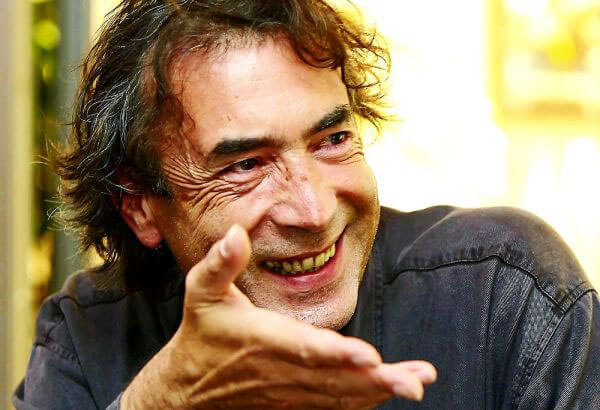
On Thursday evening Hubert von Goisern dropped anchor at the Thalia bookshop in Linz. To a crowd of about 350 he presented his book Stromlinien - Ein Logbuch (Residenz Verlag), which describes the musical journey of encounters that led him along the Danube to the Black Sea and along the waterways to the North Sea. The Oberösterreichischen Nachrichten spoke to the 57 year old.
In the beginning the prospect was of one of the last great adventures in Europe. How did romanticism and reality get one together?
Very well. But I forced them to. Romanticism is something with which I was born into the world, I don't need to nourish and cultivate it. Pragmatism isn't so much my thing, but it is forced upon me by inherent necessity. But time and again I have married the two.
In the book Weit,weit weg by Bernhard Flieher I found the sentence: "The destruction of the illusion of great, fulfilling adventures begins where they first develop." Did you go into this undertaking free from expectations?
I try not to have any expectations, but you're certainly not immune from them. But with everything I do, I have huge hopes that it will work out and be super. Otherwise I wouldn't do it. I can't climb a wall if I'm thinking, I can't manage that, I'll fall down.
In Stromlinien you throw a lot of light on the dark side: problems in getting a ship, drifting apart from the shipping company, harassment by the authorities, near accidents. Why was this important to you?
I wanted to write it the way it was. Leaving it out would have resulted in a dull book and a lie. If there is a reason for this writing, then it is that I think something like this can give courage: despite the size of a dream it is fulfillable, when you're confident you can do it.
People reproached you, saying that Linz09 are slipping you money and Red Bull's Mateschitz is adding more so that he can sell his cans. You've never answered back, apart from with the sentence "envy is a dog".
It takes too long, you'd have to write a book. Back then I had neither the time, nor the energy to react to such messages.
You write that you had a guilty conscience in using public money. How does your conscience feel today?
With the finale of the project, after the harbour festival, knew that I had nothing to be ashamed of. We did something great, for which others would have needed ten times what we did. When I think about what kind of money is frittered away on unnecessary things, we stand on pretty good ground. I think it's necessary to do something for the collective that Europe should have, and of which most dream. And that's what we did.
You were a little uneasy putting your impressions online as a logbook during the ship's journey.
I steered against it a little, in that I delayed things three or four days, in order to at least be able to sleep on it and re-read it a few times. The written word is so concrete. In conversation you can adopt the wrong tone, because the other person can say, you're mad, that's not how it is at all. Nobody can fight against the written word. And I didn't want to put anyone in a bad light. But I left both logbooks the way I wrote them, because there are reflections before, in between and after. But that should show how things were for me at that time, how stress, uncertainty, annoyance and emotions resonated. In hindsight, the waves smooth out, but before it, some rapids emerge.
Did you feel inhibited, to give away too much of yourself?
I had no inhibitions. The first version was ready more than a year ago. I gave it to my friend and manager Hage to read - and he threw his hands up in horror. When asked why, he said: "You reveal too much of yourself. An artist must mystify himself and play his cards close to his chest." But I'm made differently, there's no false floor with my music and in my life. I edited the manuscript again in the winter and took out very personal things.
Nonetheless one learns a lot about you. You're an early riser.
I can't sleep long in the morning. The moment it gets light, I'm awake. I feel the energy of the world when it wakes up. Then it grabs me and I have to get up.
An unholy anger can seize you too.
That was very embarrassing and I was surprised how vehemently I can react and what appetite for murder can appear with someone who'd call himself a Buddhist. But it could happen to anybody.
In an emergency a coffee, a cigarette and a shot of schnapps is enough for you for breakfast.
If there's nothing else.
But schnapps?
There are a few calories in it.
With the fulfilment of a dream the longing is lost. You can get it back with a new dream. Is there one?
It is an old dream that comes at the beginning of the book: to set up a music festival in Africa on Lake Tanganyika.
How are things looking with an album?
I'm composing and writing. But you can't force the process. I want to play with the band again in 2011.
Stromlinien is a documentary. What will follow?
I'd love to write a novel sometime. Fiction. I'd like to write a book where I can really spin a yarn, where I don't have to think about whether I'm doing justice to a situation I'm describing.
Breakfast with Hubert von Goisern
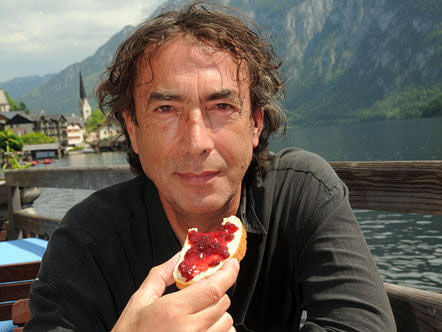
Scarcely has the musician finished writing his
book about the two-year concert tour on the Danube,
now he is dreaming of a new project while he fishes at Hallstatt Lake
Groups of Japanese people stand on the shore of the Hallstatt lake taking photos. They focus on the wooden boat - known as a Fuhr or Plätte in the Salzkammergut - with fisherman Hubert von Goisern on board.
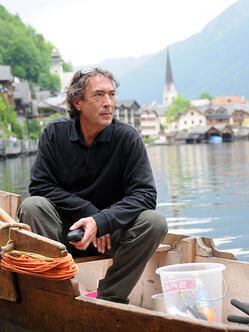
In the background is the Krippenstein and Plassen with the 3000 year old salt mine and in the foreground two ducks, letting themselves be carried by the waves.
The tourists have no idea that they have one of Austria's most famous musicians in front of their lenses.
They are simply, like all visitors, fascinated by the mighty scenery.
Hubert Achleitner, born in Bad Goisern, set off at six o'clock to to go fishing with his friend.
The spoils at 11am: a trout.
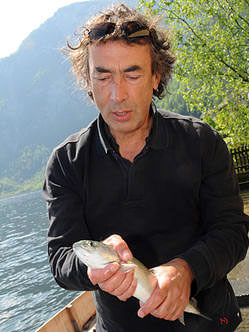 "Griaß
di, Erika", the Goiserer greets the landlady of Café Polreich
in his Goisern dialect. The 57 year old is an early riser. "Then
I drink just a cup of tea with milk and sugar." Now it's time
for breakfast: a white coffee and two slices of bread and jam. Nothing
more.
"Griaß
di, Erika", the Goiserer greets the landlady of Café Polreich
in his Goisern dialect. The 57 year old is an early riser. "Then
I drink just a cup of tea with milk and sugar." Now it's time
for breakfast: a white coffee and two slices of bread and jam. Nothing
more.
He has just returned from Africa. He has barely digested his last vision - he toured the Danube upstream and downstream to the Black Sea with a concert ship in two ten-week stretches - now he is already planning his new project.
"I want to organise a festival on Lake Tanganyika, with artists from every ethnic group that lives on the shores of this magnificent lake." His adventures bring people together. Four nations, the Congo, Tanzania, Burundi and Zambia share the almost 700 kilometre long lake.
Goisern has always been a traveller. Even before his meteoric career as musician, which began with the hit Koa Hiatamadl, he lived in South Africa for four years as a chemistry laboratory assistant and for two years with his first wife in Toronto. There the trained trumpeter, who told his parents at the age of five that he wanted to be a conductor, took lessons in flamenco guitar. And after the separation he landed in the Philippines, where he lived for a while with headhunters and learned to play a number of bamboo instruments.
"I'm not a holidaymaker. When I travel I want to do something, research, get to know people." Things happen to him, chance leads him together with other people.
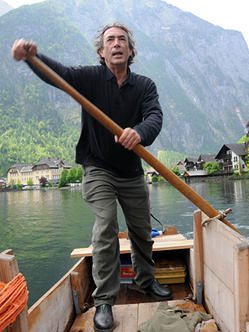 "I
am not the driving force myself. I am rather the one who is ready to
receive, who has the vigilance to see that something exciting is there."
Letting things be is his motto, that way things come to you. "There
are days where nothing can go any further. Then suddenly you let go
and in this calmness a door opens."
"I
am not the driving force myself. I am rather the one who is ready to
receive, who has the vigilance to see that something exciting is there."
Letting things be is his motto, that way things come to you. "There
are days where nothing can go any further. Then suddenly you let go
and in this calmness a door opens."
In order to raise the more than four million Euros needed for the Danube ship project the artist invested his entire income (1.5 million Euros) from his tour, he received the same again as sponsorship from Capital of Culture Linz 09, where he played his final concert, and the rest came as sponsorship from Red Bull. Thus 250,000 spectators across Europe were able to attend the concerts along the Danube river banks free of charge.
He wants to finance the Africa project with his own resources too. "Then I'll simply play another tour", says Goisern, who is working on a new CD and may compose the soundtrack for a new film Die Wand from successful director and ROMY prizewinner Julian Pölsler.
The Upper Austrian likes being among people. "I'm no autist." But when he is being creative, "I have to be alone." When working the married father of a 16 year old daughter and 22 year old son withdraws to his studio in Salzburg, which is right next to his family's home. Or he holes up in his little house in Bad Goisern.
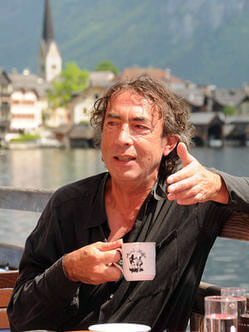 The
restless man can take time out too. "Then nothing matters to me,
I let everything hang and throw out all appointments." As a consistent
person you have to be able to say from time to time "you can't
have me now". Then he goes to the mountains, skiing in winter,
and walking in the summer, or fishing. "Water is my element."
The
restless man can take time out too. "Then nothing matters to me,
I let everything hang and throw out all appointments." As a consistent
person you have to be able to say from time to time "you can't
have me now". Then he goes to the mountains, skiing in winter,
and walking in the summer, or fishing. "Water is my element."
Can the genial person be depressed too? "Sure. When you wake up ... so many people see themselves off because there's no sun in winter." But the suicide rate declined with the economic recovery of the 70s.
Winter used to be Hubert von Goisern's favourite time. "I like the darkness, it's cosy, comfortable, the fire crackles, it's just right for composing and playing music." Now he likes summer just as much as winter. "I want to experience how the trees bud, how everything then becomes really lush and when things really steam in the summer." Only in February, when there's no snow, but nothing is blooming either, "I get the blues".
The man, who once got the push as trumpeter in the local brass band because of his long hair and who needs no background music, because "I always have music in my head", is happy. His travels have taught the musician one thing: "You can't buy happiness. You're happy when you climb a mountain and conquer your weaker self. Not when you have yourself flown up there in a helicopter."
Neither does Hubert von Goisern start the little motor to steer the boat across the lake and into the boathouse. Standing, Hubert rows, sweat runs down his cheeks, but his eyes are shining. The Catholic, who has left the church, finds God "when I'm in my centre". Religions are the path to God. "I prefer to go on foot."
--- SUNDAY QUESTIONS ---
My first thought on waking
Is it light yet, or still dark? I hear the birds singing before I open my eyes.
Humour is, ...
... when you can laugh at yourself.
When I have time ...
... I read a book, or like to go to the cinema.
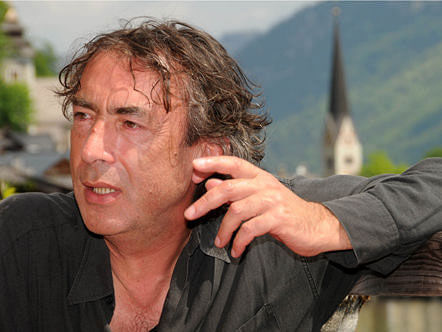
The first look into the mirror
Seldom, I only look in the mirror when I shave.
Luxury is ...
... having more than you need.
My Sunday reading material
I love to read Furche. Daily papers stress me out, because I can't keep up.
Tea or coffee?
Both with milk and sugar.
A Sunday I'll never forget
The last Whitsun Sunday, I was at the Protestant church for my nephew's confirmation. That was an experience, everyone in traditional dress, an image that moved me.
My appetite can be ruined by ...
An argumentative person.
I'll never eat ...
I've eaten everything that I've been served. From beetles to spiders, to dogs. But cannibalism is unfathomable for me.
My favourite food is ...
Risotto Milanese, with parmesan, onions and saffron. I likes dishes that you can spoon.
The logbook of Mr H.
Hubert von Goisern covered 12,000 kilometres on
the Danube with a converted cargo ship
for his
"Linz Europe Tour East and West". Now he presents a travel
diary.
Here he tells of his relationship to the Danube, to the supporters
and naysayers of his project.
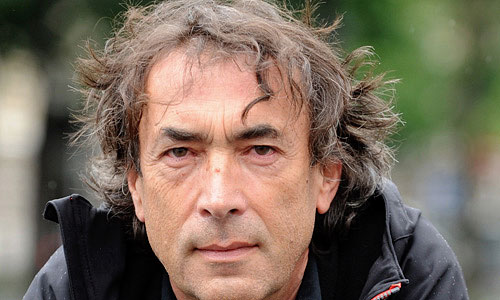 The
converted cargo ship the music crew called the "Wallsee" has
long since been dismantled and is transporting ballast on the Danube.
The musicians are back on dry land. What remains of such an experiment
is the memories. And Hubert von Goisern has many of those. That is
why he has now written them down for posterity and published them in
a logbook.
The
converted cargo ship the music crew called the "Wallsee" has
long since been dismantled and is transporting ballast on the Danube.
The musicians are back on dry land. What remains of such an experiment
is the memories. And Hubert von Goisern has many of those. That is
why he has now written them down for posterity and published them in
a logbook.
"Many advised against" him publishing, he says. Advised against revealing so much. "Because of course it makes me vulnerable," says Goisern. "An artist should have an air of mystery about him, so that he offers the audience a larger object of projection." A short pause. "But I don't care." A short mischievous laugh. Hubert von Goisern rarely listens to advice that starts with "you should". It was that way with the musical journey along the Danube too, the Linz Europe Tour East and West, which began in summer 2007 and ended with the Linz Europe Harbour Festival in summer 2009. He covered 12,000 Danube kilometres with his musicians on a converted cargo ship, he travelled through 12 countries and played about 60 gigs on the ship's stage in cities such as Novi Sad, Budapest, Sofia and Bucharest. It wasn't the case that his relationship to the Danube improved, but rather that it was first established. "I had no connection to the Danube beforehand", he says. Because in many places - and not just in Austria - it is anything but lovely, the shoreline being barely there, if at all. "Presumably because it breaks its banks every year and it would be too expensive to build anything there." Only in Linz is the Danube firmly embedded in the cityscape and the people live "with" the river.
Beginning and end. However he doesn't miss the water, which surrounded him for two summers and a bit. "It's raining a lot at the moment," he says. And there's the mischievous smile again. "It was really great, but it has to have a beginning and an end somewhere. Even though I would have loved to have added on another summer and said goodbye with a heavy heart, and because it was such a huge effort to make the ship float." The actual size of the effort is also shown by his book Stromlinien, the lavish logbook of the journey, which has just been published and in which day by day, stop by stop the journey is critically described. Not until page 108 does the cargo ship finally cast off, until then the singer-songwriter tells only the story of the path to finding funds and sponsors - a journey arduous and sometimes laborious enough to make you tear out your hair.
The search for comrades-in-arms was at times eye-opening. Because even though he was now and then met with a mixture of disbelief and disinterest in other cities along the Danube, "the greatest scepticism", says Goisern, was to be found "at home in Austria". Something that he to some extent understands. "The cultural offering is much greater here than in the eastern countries. There's a certain degree of saturation." Anyone who comes along with a new idea is met with a sneer at first.
In the end he financed the Danube tour with a third coming from his own money, with money from the Linz 09 Capital of Culture's pot and with help from Red Bull big shot Dietrich Mateschitz. The singer-songwriter and the CEO already knew each other. Goisern wrote an anthem for Mateschitz's Red Bull Salzburg football club. And Mateschitz was enthusiastic about Goisern's expedition by ship right from the start. It didn't bother Goisern that there were free energy drinks on board the barge. "He never demanded that I do promotion for his business", says Goisern. "He just wanted me to do a private concert for him and his friends." Pause. "Which we did."
Hubert von Goisern is a calm, thoughtful man. What he does, he does from conviction. You can feel it. He is no longer only associated with Hiatamadl, which made him and the Alpinkatzen suddenly famous at the beginning of the 90s. On the contrary, there are now young people who don't even know the song.
"Of course you start at zero with people again. On the other hand it saves you being reduced to this one folk song. I'm not complaining that this song exists, nor that there are many people who don't know it any more". But it feels nice when he "walks through the streets and people are pleased to see me."
"Writing made me feel like a fish out of water"

LINZ. Stromlinien - Ein Logbuch is the name of Hubert von Goisern's first book, in which he describes in detail the experiences of his Linz Europe Tour for the Capital of Culture. In the Tips interview the musician talks about Linz09, why his next book will be a novel and why music is for him a form of voodoo.
Linz09 has been history for six months. What's your personal resumé?
Through distance the year has gained meaning for me. As an outside I think it was a great win for Linz, a lot of people now know that Linz is there. The people of Linz too have become more aware of their own homeland.
Did you count on your Linz Europe Tour being such a success?
Well, if I hadn't been convinced, I wouldn't have gone on with the project. When you start something you always paint it in the most beautiful colours. In putting it into action though you are subjected to factual constraints.
Was a book about the three years always part of the plan?
The organisers wanted me to write a weblog during the journeys to the east and west. The book has now developed from this blog, fleshed out with connecting passages about the project. At the moment I'm curious to hear feedback on the book, be it feels a bit foreign to me. It's almost as though I'm seeing myself for the first time in the mirror.
Do you enjoy reading?
I do and I read a lot, but I often don't give myself enough time for it. The pile of books to read is growing, they're mainly nonfiction. I'm very interested in stories and anything to do with Africa. When the subject is right I toil through difficult texts too, but I'm grateful when someone can write well. I'm by no means a literary man, it's the music that flows by itself.
Could you imagine another book?
A novel, yes. With nonfiction all the facts are there to be scrutinised, you want to do justice to people. Of course that's difficult when you are describing situations of conflict. With a novel you can think up anything, be politically incorrect, play with fantasy. But for now I'm happy that the writing is done with. I felt like a fish out of water. Music is my water.
Do you want to tell the reader anything?
I want to give other people the courage to realise their dream. My manager actually advised me not to publish the book. I would reveal too much of myself and there should always be a certain element of myth around an artist. So now people know how I tick. I also see the book as the conclusion to the whole project. I'm happy that everything went well and nowadays sometimes I think that I should have enjoyed it much more. However I was always so hyped up and under pressure, I had to think much too much.
What does music mean for you?
For me music is a form of voodoo, of magic. It takes people out of the everyday life into a dream world. Music is good if it cuts the ground from under you. Of course that leads to conflicts too, for example with religion. Personally, I like nearly all music when it is played with heart and intensity. Mind you, I have a hard time with folksy music, or Dixieland. Schlager music is often so strange that it makes me laugh. If music is to grab me, it has to tell a story.
Hubert von Goisern: Reading in Munich - 18th May 2010

Hubert von Goisern: Reading in Munich - 18th May 2010
Photo: © Elli Christl
Hubert von Goisern: Reading in Munich - 18th May 2010
Photo: © Elli Christl
Hubert von Goisern: Reading in Munich - 18th May 2010
Photo: © Elli Christl
Hubert von Goisern: Reading in Munich - 18th May 2010
Photo: © Elli Christl
Hubert von Goisern: Reading in Munich - 18th May 2010
Photo: © Elli Christl
Hubert von Goisern: Reading in Munich - 18th May 2010
Photo: © Elli Christl
Hubert von Goisern: Reading in Munich - 18th May 2010
Photo: © Elli Christl
Hubert von Goisern: Reading in Munich - 18th May 2010
Photo: © Elli Christl"Stromlinien - Ein Logbuch": The adventures of Hubert von Goisern
The singer presents his records of the preparations
for and execution of the
Danube ship concert tour 2007/2008 in book form.
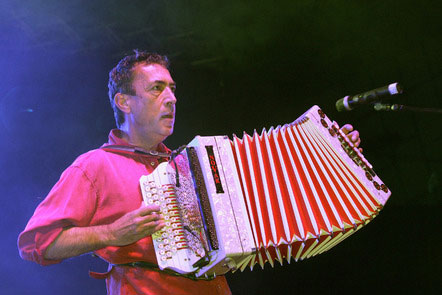 Vienna
- Before Hubert von Goisern's adventure in the form of the spectacular
concert tour by ship southeast and northwest along the Danube even
began, he felt pressured to write a public weblog. He did so, even
though he wasn't happy with the thought of it, from fear of unfiltered,
unreflected truth. Now his records have been published in book form
with the title Stromlinien (Streamlines)
- an exciting, attractively designed logbook of a European border crosser
well worth reading, with border crossings on all levels and the recognition
that the most insurmountable frontiers are to be found in people's heads.
Vienna
- Before Hubert von Goisern's adventure in the form of the spectacular
concert tour by ship southeast and northwest along the Danube even
began, he felt pressured to write a public weblog. He did so, even
though he wasn't happy with the thought of it, from fear of unfiltered,
unreflected truth. Now his records have been published in book form
with the title Stromlinien (Streamlines)
- an exciting, attractively designed logbook of a European border crosser
well worth reading, with border crossings on all levels and the recognition
that the most insurmountable frontiers are to be found in people's heads.
As early as 1997 von Goisern played with the idea of organising a festival on Lake Tanganyika in East Africa. It never happened on account of the chaos of war and other problems. When in 2005 a befriended ship owner suggested: "You could do something like that on the Danube too", the seed of the river project was sown. The first attempt to get a ship led to meetings with the authorities "right up to the Secretary of State", but the attempt remained fruitless, because "with my request I was really just a threat to their carefully guarded dozing. There were also conversations about the project at the Federal Chancellery, with ministers, EU representatives in Strasbourg and Brussels, but there was nothing to gain aside from congratulations and patronage . Until he met the Linz 09 manager Martin Heller, who took the musician on board as ambassador for the Capital of Culture.
The first reconnaissance trip eastwards by car brought few promising meetings with contacts. The director if the Bratislava Music Center was primarily worried about the adverse effects of gnats. In Budapest followed the advice not to play there. And the director of the Austrian Culture Forum in Belgrade "seemed stressed out and really didn't know what to do with me". Aside from that, she hadn't only misunderstood the Goisern project, but had also confused it with something else.
Support from Mateschitz
The further south he advanced, the more promising things looked. The first contacts with musicians and bands were established, promises were made. However the rejection of gypsy music that was to be found everywhere remained disconcerting. Not anywhere did people want to see "their country" represented by gypsies. In conclusion: von Goisern had fallen in love with the Balkans. The undertaking was unquestionable for him, but the financing was unsolvable. A meeting was arranged with Dietrich Mateschitz, who was immediately full of enthusiasm and thereupon supported the enterprise more than generously throughout. A new band had to be found too, one which should be "powerful, lively, full of relish and loud", in order to be equal to the special demands of the concerts.
Hubert von Goisern describes in detail with a certain degree of self-criticism, but is particularly ruthless in describing his meetings and experiences and doesn't mince his words: right at the beginning of the East Tour the concert premiere at the Donauinselfest in Vienna fell through due to a thunderstorm. The frustration was great, not least the anger at "this glib Viennese cultural politician, who lured us to the island - and he broke his word with a smile and didn't count a penny. Conned by a non-Conservative."
Goisern Goes West
Goisern looks back at each day, each stop and tells of the impertinence of the shipping company, of smug harbour masters, the bureaucratically obtuse, sparse audiences in the northwest and defeats that not only forced his emergency hospitalisation, but also the cancellation of concerts. In 2009 the project has its finale: at the Linz Europe Harbour Festival von Goisern and a multitude of new musical friends finish off the stupendous project. The recently released DVD Goisern Goes West/Hafenfest rounds off the review of events as the second part of the audio-visual documentary.
Hubert von Goisern, who always dissolves his bands as fast as he puts together new ones is currently taking a break. But he has promised his "ship musicians" to undertake a new musical journey in the same lineup from 2011.
HvG at the Rauriser Literaturtage

Hubert von Goisern at the Rauriser Literaturtagen
Photo: © David Sailer IMAGES 2010
Hubert von Goisern at the Rauriser Literaturtagen
Photo: © David Sailer IMAGES 2010
Hubert von Goisern at the Rauriser Literaturtagen
Photo: © David Sailer IMAGES 2010
Hubert von Goisern at the Rauriser Literaturtagen
Photo: © David Sailer IMAGES 2010
Hubert von Goisern at the Rauriser Literaturtagen
Photo: © David Sailer IMAGES 2010
Hubert von Goisern at the Rauriser Literaturtagen
Photo: © David Sailer IMAGES 2010
Hubert von Goisern at the Rauriser Literaturtagen
Photo: © David Sailer IMAGES 2010
Hubert von Goisern at the Rauriser Literaturtagen
Photo: © David Sailer IMAGES 2010
Hubert von Goisern at the Rauriser Literaturtagen
Photo: © David Sailer IMAGES 2010
Hubert von Goisern at the Rauriser Literaturtagen
Photo: © David Sailer IMAGES 2010Travelling
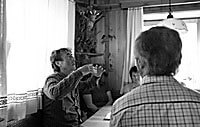
Whom did you find on your travels, was the question among the authors visiting the Rauris valley. On Friday afternoon they all trickle back to the Rauriser-Hof, looking a bit done in, but happy. They were doing travel readings. It has become the paraphrasing of one custom into another. The same way the craftsmen offer their trades and go door to door, the RLT authors set off and in return for tasty Pinzgau fare, they read in the living rooms of Rauris, at the farms in the presence of the farm families and their friends. The talk is of life and writing and storytelling.
Along the Danube
The logbook "Stromlinien" tells of the journey that Hubert von Goisern under took with his friends on his transport barge converted to a concert ship. He spoke to Bernhard Flieher about writing, music and travel.
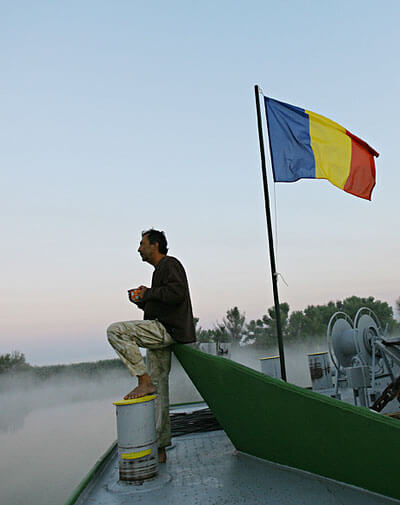 Which
is more difficult: composing a song, or writing a book?
Which
is more difficult: composing a song, or writing a book?
I'd say they're equally difficult - if you compare a song with a chapter.
Where do the differences in the work lie?
With music more levels take place at the same time - unless you want to get a monophonic solo. But a book is always linear, even if there are several strands to handle, or there are different viewpoints.
Stromlinien, your first book, is like a diary. Were you afraid that less would remain of the journeys if you didn't write it down?
Neither writing, nor pictures, or even film material can conserve what happens. Writing down what you experience and what takes place is more like talking to yourself. Writing helps to formulate and formulating helps when thinking about something.
How would you define what the Linz Europe Tour was, which is described in this book?
It was an exercise in interaction. In many ways, too: between people, on board and certainly between the people we met along the way too, with whom we played.
You said of this three year tour that it was your hitherto greatest adventure - and the greatest effort too. You're one of the most successful artists in the country and someone who is respected beyond that as a political person and involved citizen. So why do you have to take on something like this?
I do it, because it's not enough for me just to let my eyes and mind wander into the distance. Whenever I think to myself, that's a good idea, I want - yes, must test it out too.
You grew up in Bad Goisern among the mountains. To what extent do such origins affect the desire to look beyond the horizon?
I have no idea, because I don't know what it's like to come from somewhere else. I think you can do pretty much everything from any situation.
In Stromlinien you combine three levels: the preparatory trips, the actual tour on the ship and finally reflections after you return home are incorporated into the text too. Which things most clearly changed their priority in this review?
The fact that this tour took place at all seems a miracle to me in hindsight.
After the many months on the ship, how difficult was it to return from the river to the immovable earth?
I'm not someone who cries over the past for long. Apart from that: the earth's not so immovable, as we know.
How did this journey change your outlook?
I didn't get any wiser, if that's what you mean, but "my Europe" has certainly grown larger.
Have further projects resulted from the artistic encounters between Rotterdam and the Black Sea?
I won friends on this journey and the circle has by no means closed. But as far as future projects are concerned, I've imposed a gag order on myself for the time being. It's enough to be doing it.
How about another book? Are there any plans for such, or is one enough for a musician?
I'd love to write a novel sometime. To be able to give free reign to fantasy, giving no consideration to the characters involved - I imagine that to be pretty exciting. But there's still time. For the next while I want to occupy myself principally with music.
